

Shell units shed $495m after huge refinery writedown – Royal Dutch Shell plc .com. IAG smart to kill Buzz, analyst says. Lloyds sells distressed Australian loans. ANZ targets transaction fees. Big banks split on rate cut. “While these have come down in the past few weeks, they still remain high and there remains intense competition for this form of funding,” Westpac group executive of retail and business banking Jason Yetton said.
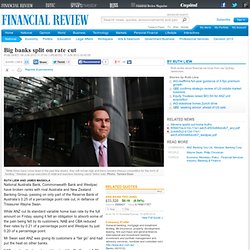
Photo: Tamara Dean Ruth Liew and James Massola National Australia Bank, Commonwealth Bank and Westpac have broken ranks with rival Australia and New Zealand Banking Group, passing on only part of the Reserve Bank of Australia’s 0.25 of a percentage point rate cut, in defiance of Treasurer Wayne Swan. While ANZ cut its standard variable home loan rate by the full amount on Friday, saying it felt an obligation to absorb some of the pain being felt by its customers, NAB and CBA reduced their rates by 0.21 of a percentage point and Westpac by just 0.20 of a percentage point.
Mr Swan said ANZ was giving its customers a “fair go” and had put the heat on other banks. Hey Brother, Can You Spare $500 Billion for America's Banks? It may be spring in much of the country, but the air in the financial world carries a definite chill reminiscent of the fall of 2008.
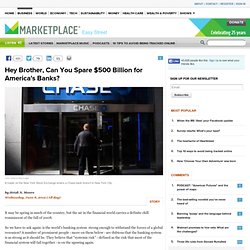
So we have to ask again: is the world's banking system strong enough to withstand the forces of a global recession? A number of prominent people - more on them below - are dubious that the banking system is as strong as it should be. They believe that "systemic risk" - defined as the risk that most of the financial system will fail together - is on the upswing again. If you forgot the term "systemic risk" from your 2009-vintage financial crisis dictionary, it refers to the state of affairs when the financial system as a whole is "undercapitalized" - which means that banks don't have enough money to continue doing business. The whole system becomes at risk - thus, "systemic risk. " One Nobel Prize winner - economist Robert Engle- has some pretty chilling predictions on just how much money it would take us to bail out a struggling financial system.
Www.stanford.edu/dept/MSandE/cgi-bin/people/faculty/giesecke/pdfs/systemic.pdf. Resources boom to the rescue. Jacob Greber Economics correspondent.
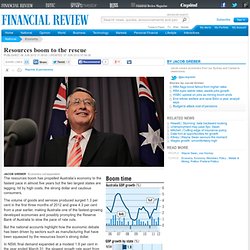
High costs could kill big projects. Luke Forrestal and Louise Dodson Rigid and archaic work practices that have bedevilled industry in Australia for decades are among the problems threatening $921 billion in resource projects, according to the Business Council of Australia.
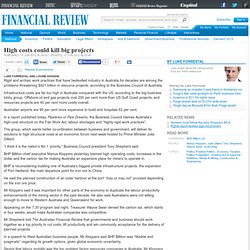
Infrastructure costs are far too high in Australia compared with the US, according to the big-business lobby group. Offshore oil and gas projects cost 200 per cent more than US Gulf Coast projects, and resources projects are 40 per cent more costly overall. Australian airports are 90 per cent more expensive to build and hospitals 62 per cent. In a report published today, Pipelines or Pipe Dreams, the Business Council blames Australia’s high-cost structure on the Fair Work Act, labour shortages and “highly rigid work practices”. The group, which wants better co-ordination between business and government, will deliver its solutions to high structural costs at an economic forum next week hosted by Prime Minister Julia Gillard. BHP boss spots the growth difference. ‘Stunning’ data backward looking.
Merger creates Australia's biggest coal miner. "The board believes that the benefits of the merger proposal outweigh the concerns associated with the level of gearing" ...
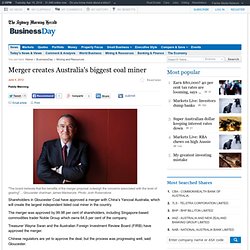
Gloucester chariman James Mackenzie. Photo: Josh Robenstone Shareholders in Gloucester Coal have approved a merger with China’s Yancoal Australia, which will create the largest independent listed coal miner in the country. The merger was approved by 99.98 per cent of shareholders, including Singapore-based commodities trader Noble Group which owns 64.5 per cent of the company. Treasurer Wayne Swan and the Australian Foreign Investment Review Board (FIRB) have approved the merger.
Chinese regulators are yet to approve the deal, but the process was progressing well, said Gloucester. Advertisement It is the biggest investment by a Chinese state-owned company in Australia’s coal industry. Yancoal’s cash and scrip bid was valued by independent experts Deloitte at between $9.35 and $9.48 per Gloucester share. With AAP. Spain finally admits it’s broke.
Panic has become all too rational. China’s easing will be felt here. Land of the angry and entitled. Australia GDP surges in first quarter. Shares lifted by GDP result. $A takes off on strong GDP figures. Australia’s credit rating at risk? Jacob Greber Economics correspondent Credit ratings agency Standard & Poor’s has warned it could cut Australia’s coveted AAA rating if the federal government abandons the budget surplus in response to a global recession triggered by the European debt crisis.

The warning, which followed signs that Treasury is prepared to drop the long sought-after surplus target, came amid more evidence of economic weakness in Australian manufacturing and house prices, and signs that the European crisis was spreading to China, South Korea and other Asian economies. Economists say an Asian economic downturn would drive up unemployment in Australia, sending the budget into deficit without more spending cuts. Cutting edge of insurance policy. Breaking point for brokers. S&P calls for local bond market.